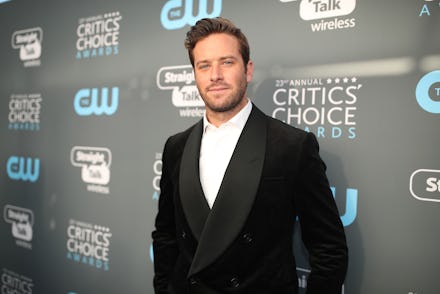What do we do with the new movies starring accused Bad Men?

"Cancel culture" has posed a unique conundrum for Hollywood: what to do when a forthcoming film or TV show features someone accused of heinous transgressions? If you’re like director Ridley Scott, you’ll drop millions to replace the accused star and reshoot your feature. But not all projects have the budget to go to such great lengths to erase an alleged Bad Man — or perhaps the powers that be simply hope people won't notice or care enough to make it necessary. Either (or both) could be the case with upcoming films starring recently-disgraced celebrities Shia LaBeouf and Armie Hammer.
Take Pieces of a Woman, Netflix’s awards contender about the emotional fallout of a tragic home birth, starring Vanessa Kirby and LaBeouf as the grieving couple at its center. After FKA Twigs filed a lawsuit against the actor in December 2020, alleging he abused her during their relationship, Netflix quietly removed LaBeouf's name from publicity materials and awards promotion. A source close to the project told IndieWire that even without the accusations, Kirby and supporting actress Ellen Burstyn — not LaBeouf — were at the center of the streamer’s awards campaign.
Then there is Armie Hammer, who has been at the center of salacious rumors about cannibalistic sexual proclivities. Several of Hammer’s former partners say those outrageous claims are a smokescreen for a devious pattern of emotional abuse, manipulation and coercion.
In the wake of these allegations, the towering actor known for Call Me By Your Name and The Social Network was reportedly forced out of multiple projects that hadn't been filmed yet: a romantic comedy titled Shotgun Wedding, co-starring Jennifer Lopez, and a TV series about the making of The Godfather called The Offer. But at least two of Hammer’s already-wrapped films are still slated for release this year. The addiction thriller Crisis is slated for March 5, and an adaptation of Agatha Christie’s Death on the Nile, co-starring Gal Gadot, is due later this year.
In the cases of Crisis, an executive familiar with the film told Page Six that the movie didn't have the budget for a reshoot — but it seems at least some people involved are trying to downplay Hammer's role. Hammer's co-star Evangeline Lilly seemingly snubbed the actor in an Instagram post about the film. At the end of her caption alongside the movie poster — which includes Hammer's face between Lilly's and Gary Oldman's — Lilly wrote, "and proud to be in this poster with #GaryOldman."
But is it enough to omit these actors' names from publicity materials? Will anyone actually want to watch the movies? The question of how to separate the art from the artist has become a defining paradox of the post-#MeToo era. You can see critics grappling with this very issue in Allen v. Farrow, the new HBO docuseries about the allegations of child abuse against Woody Allen. There’s a sequence in the first episode where industry luminaries reflect on the profound influence his films had on their lives. It’s a difficult legacy to reconcile with the heinous things Allen is accused of doing to his seven-year-old daughter, Dylan Farrow.
Whether viewers can or want to suspend their understanding of reality in order to enjoy entertainment featuring a possibly unsavory individual is a personal decision. I personally can’t imagine being able to revisit any of Hammer or LaBeouf’s films without my perception being poisoned by the actors’ alleged transgressions.
But one artist who has navigated this conundrum with grace is Alma Har’el, who directed LaBeouf in his semi-autobiographical film Honey Boy and subsequently spoke out in support of Twigs and other victims of domestic violence. “As a filmmaker and an artist, I am drawn to stories that help us develop empathy for the messy parts of the human condition,” Har’el wrote in a statement following news of the allegations.
But, she added, art should never be a scapegoat for abuse: “Like many of Shia’s collaborators and fans who battled substance abuse, suffered childhood trauma and face mental illness, I am painfully aware of my past investment in his recovery,” she wrote. “I want to send a clear message today that none of the above should excuse, minimize or rationalize domestic violence.”